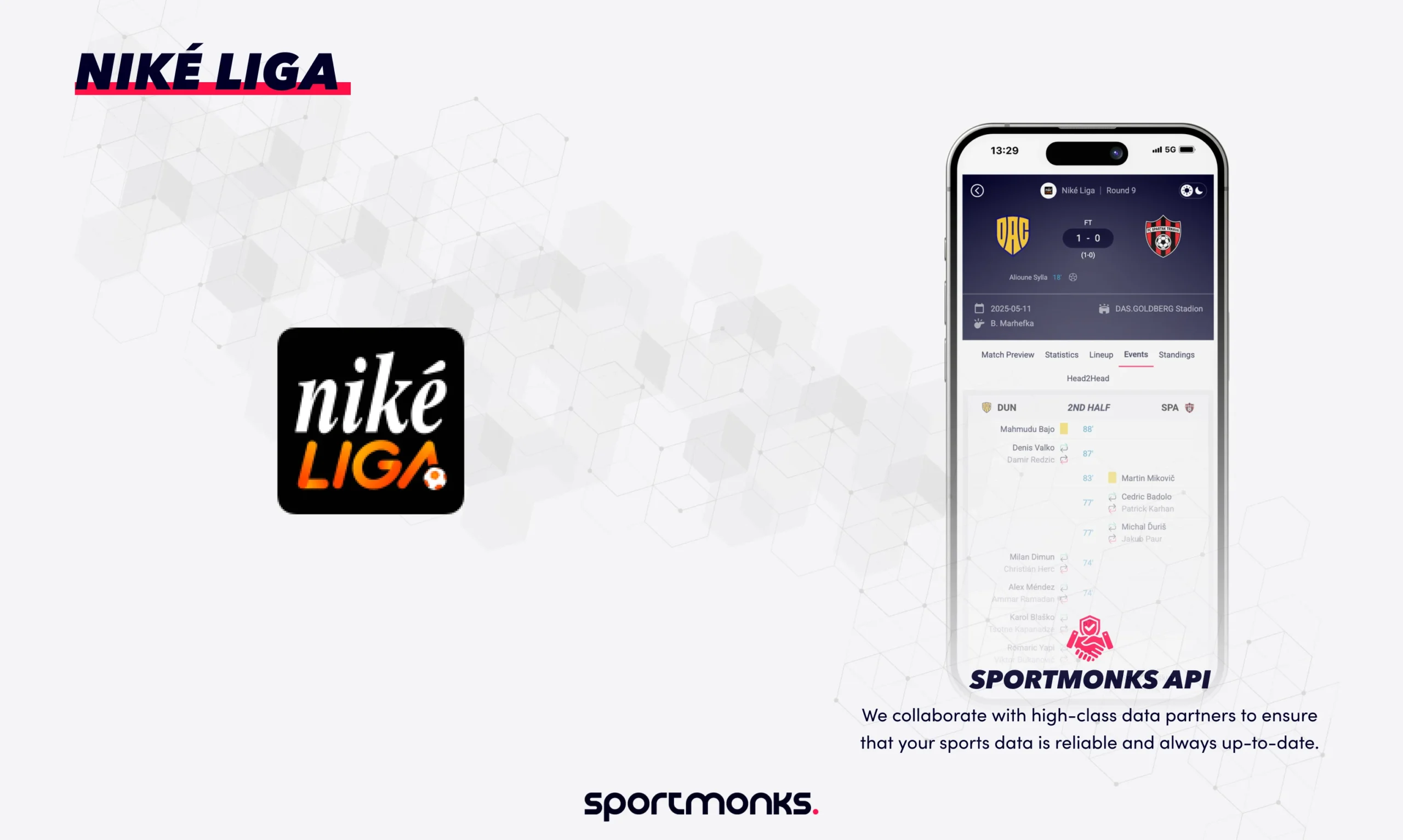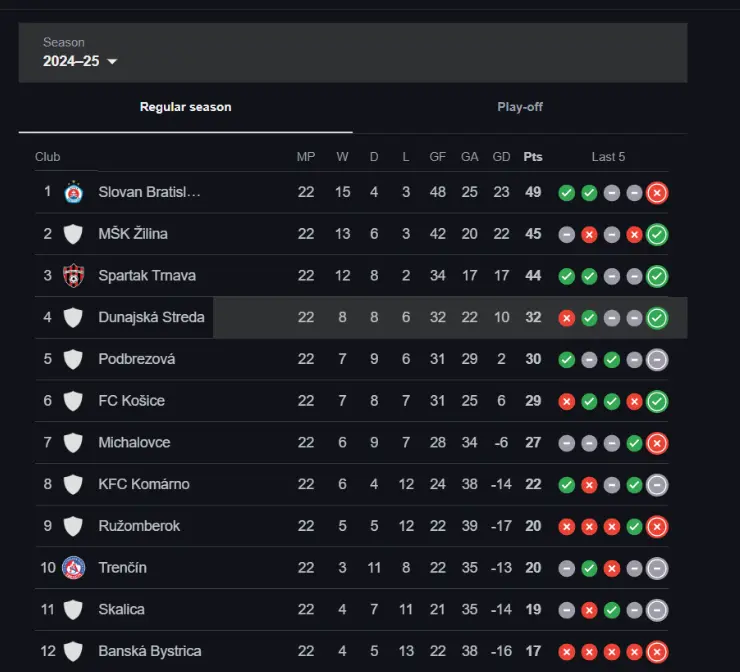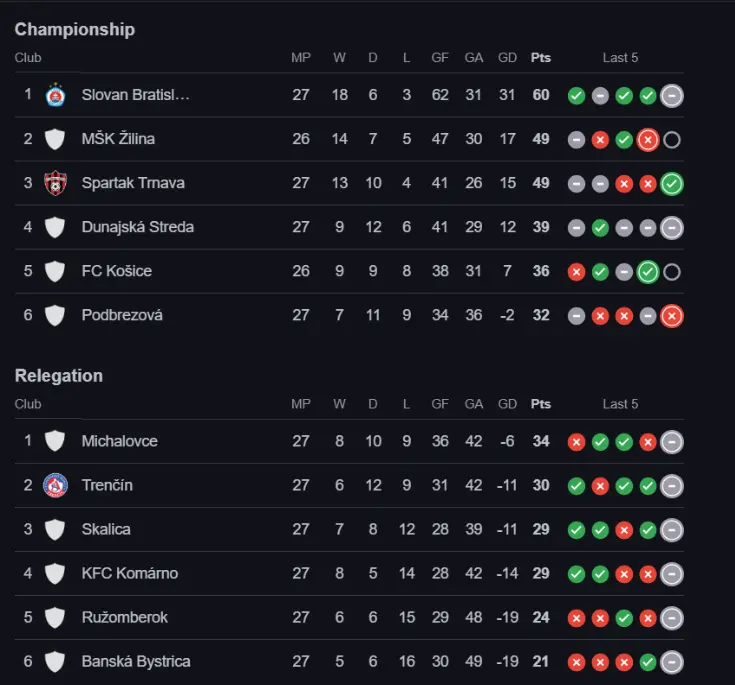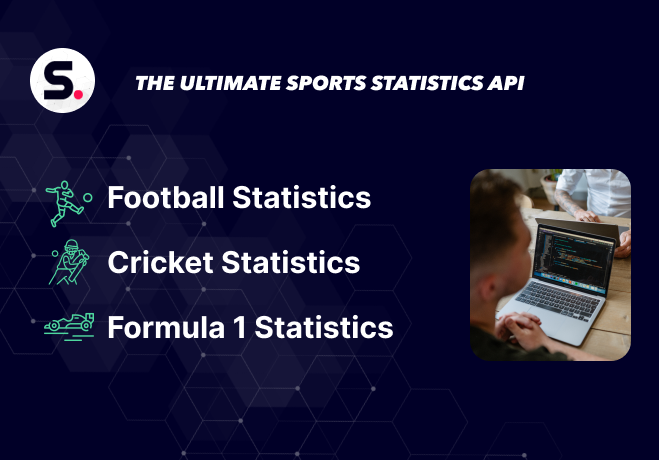
Contents
Formation of the Slovakian Super Liga
The Slovakian Super Liga’s origins are linked to the dissolution of Czechoslovakia on January 1, 1993. Prior to this, the best Slovak clubs competed in the Czechoslovak First League, a league that featured prominent teams from both the Czech and Slovak regions. Following independence, the need for a separate and independent Slovak top-tier football competition became evident.
The Slovak Football Association (SFZ) oversaw the establishment of the first Slovakian Super Liga for the 1993-94 season. This first league competition included 12 teams, many of whom previously played in the Czechoslovak league system or the Slovak National League (the second tier of Czechoslovak football).
ŠK Slovan Bratislava came out on top as the early dominant force in the newly formed league, winning the first three consecutive titles. Other clubs like 1. FC Košice (now FC Košice) also established themselves as key challengers in the league’s early years.
The league has gone through changes in format and the number of participating teams throughout its history. Initially, it had 12 teams, it expanded to 16 clubs for a period in the late 1990s before settling back to 10 teams for several seasons in the early 2000s. Since the 2006-07 season, the league has maintained a format of 12 teams. A format change was introduced in the 2017-18 season, which split the league into a championship group and a relegation group after the initial phase.
Format of the Slovakian Super Liga
The Slovak league currently comprises 12 teams. The season is divided into two distinct phases:
Regular season
In the initial phase, each of the 12 teams plays every other team twice – once at home and once away – making a total of 22 matches per club.

Championship and relegation groups
After the regular season, the league table is split into two groups of six teams each based on team performance. The top six teams form the “championship group,” while the bottom six form the “relegation group.” In these groups, each team plays the other five teams twice more (home and away), making it in an additional 10 matches per club. The points accumulated during the regular season are carried over to this second phase (relegation/playoff matches).

Points system
Teams are awarded three points for a win, one point for a draw, and no points for a loss.
European qualification
The teams that finish highest in the championship group qualify for UEFA club competitions based on Slovakia’s UEFA coefficient:
– The league champion qualifies for the UEFA Champions League first qualifying round.
– The runners-up and the third-placed team qualify for the UEFA Europa Conference League second qualifying round.
– The winner of the Slovak Cup also qualifies for the UEFA Europa Conference League second qualifying round. If the Cup winner has already secured a European spot through their league position, the next highest-placed league team (that hasn’t already qualified) will take the Europa Conference League place.
Promotion and relegation
– The team finishing at the bottom of the relegation group is directly relegated to the Slovak Second League (2. Liga).
– The team finishing in 11th place enters a two-legged relegation play-off against the runner-up of the Slovak Second League to determine which team will play in the Super Liga the following season.
– The champion of the Slovak Second League is automatically promoted to the Super Liga.
Notable Slovakian Super Liga history
The Slovakian Super Liga is home to several prominent clubs and talented players who have left their mark on the league and Slovak football as a whole.
Notable clubs
– ŠK Slovan Bratislava: The most successful club in Slovakia’s football history, boasting multiple Super Liga titles since 1993, with a total of 22 titles including those from the Czechoslovak First League before independence. They have also had periods of success in European competitions, winning the UEFA Cup Winners’ Cup in 1969 and reaching the quarter-finals in 1962 and 1963.
– MŠK Žilina: Another historically strong club with multiple league titles (7). They were also the third Slovak club to reach the UEFA Champions League group stage.
– 1. FC Košice (formerly VSS Košice): A club with a rich history dating back to the Czechoslovak era, they won two Super Liga titles in the late 1990s and have a strong regional fanbase.
– Artmedia Bratislava (now Petržalka): Achieved notable success in the mid-2000s, winning two league titles and famously reaching the group stage of the UEFA Champions League in the 2005-06 season.
– FK AS Trenčín: Known for their attractive, attacking football under various managers, they secured two consecutive league titles in the mid-2010s.
– FC Spartak Trnava: A club with a passionate fanbase and a significant history in Czechoslovak football, they finally won their first independent Slovak title in 2017-18.
Key players
The Super Liga has seen many talented players, some of whom have gone on to achieve international recognition. Notable examples include:
– Marek Hamšík: Began his professional career at Slovan Bratislava before becoming a legend at Napoli and a key player for the Slovak national team.
– Martin Škrtel: Started his career at AS Trenčín before becoming a long-serving defender for Liverpool and the Slovak national team captain.
– Róbert Vittek: A prolific striker who played for several Super Liga clubs and was a key forward for Slovakia, notably at the 2010 FIFA World Cup.
– Marek Mintál: A highly successful midfielder and top scorer in the league while playing for Žilina, later enjoying a successful career in Germany.
– Szilárd Németh: A talented forward who was a top scorer in the league while playing for Inter Bratislava before moving to the English Premier League.
The Slovakian Super Liga in European football
While the Slovakian Super Liga may not be one of Europe’s top-tier leagues in terms of financial power or global recognition, its clubs have had moments of significance in European football leagues, contributing to European football.
ŠK Slovan Bratislava’s memorable victory
The most iconic moment for Slovak club football in Europe came in 1969 when Slovan Bratislava, representing Czechoslovakia at the time, won the UEFA Cup Winners’ Cup, defeating FC Barcelona in the final. This remains the only major European club trophy won by a Slovak team.
Champions league group stage appearances
Three Slovak clubs have reached the group stage of the UEFA Champions League:
– Artmedia Bratislava achieved this feat in the 2005-06 season, causing a major upset by defeating Celtic in the qualifying rounds.
– MŠK Žilina qualified for the group stage in the 2010-11 season.
– ŠK Slovan Bratislava reached the group stage of the rebranded UEFA Champions League in the 2024-25 season.
Europa league/UEFA cup participation
Several Slovak clubs, including Slovan Bratislava, MŠK Žilina, Spartak Trnava, and others, have regularly participated in the UEFA Europa League (and its predecessor, the UEFA Cup), often reaching the group stages and providing competitive matches against clubs from more prominent leagues.
UEFA Europa conference league
In recent years, the UEFA Europa Conference League has provided another platform for Slovak clubs to gain European experience and achieve notable results, such as FC Spartak Trnava reaching the group stage.
Challenges and opportunities
Slovak clubs face more money problems compared to their counterparts in richer European leagues, making consistent success in UEFA competitions hard. However, their participation is an incentive for teams as it adds crucial revenue, helps raise the league’s profile, and inspires younger generations of Slovak footballers. Memorable victories and strong performances against higher-ranked teams serve as important milestones and contribute to national footballing pride.
While the Slovakian Super Liga’s impact on the very top of Europe might be scarce, its contribution to the development of Slovak talent and its occasional successes in UEFA competitions are significant for the nation’s football.
Enhance user engagement with Sportmonks live football data
Keep your users engaged by providing them with up-to-the-minute football information. The Sportmonks football API offers live scores, match events, and player insights, ensuring your platform remains current and informative. With data from leagues across the globe, you can cater to a diverse audience and keep them coming back for more.
Try Sportmonks for free and see how real-time data can elevate your user experience.



